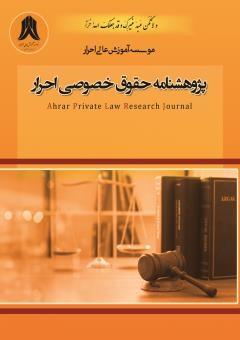نقدی بر کاستی های قانون روابط موجر و مستأجر سال1376
محورهای موضوعی : حقوق مدنیامیررضا محمودی 1 , مصطفی عباسی 2 * , سیده مهشید میری بالاجورشری 3
1 - استادیارحقوق عمومی، گروه حقوق، دانشکده علوم انسانی، واحد لاهیجان، دانشگاه آزاد اسلامی، لاهیجان، ایران.
2 - دانشجوی دکتری حقوق جزا و جرم شناسی، گروه حقوق، دانشکده علوم نسانی، واحد لاهیجان، دانشگاه آزاد اسلامی، لاهیجان، ایران.
3 - کارشناسی ارشد حقوق جزا و جرم شناسی، گروه حقوق، دانشکده علوم انسانی، واحد لاهیجان، دانشگاه آزاد اسلامی، لاهیجان، ایران.
کلید واژه: اجاره, موجر, مستاجر, قانون روابط موجر و مستاجر. ,
چکیده مقاله :
داستان روابط موجر و مستأجر، قصه ای ، تقریباً قدیمی است. از دیر زمان موجران در پی آن بوده اند که با تخلیه ملکشان آن را به قیمت بیشتر اجاره دهند و مستأجران نیز همیشه می خواسته اند که اجاره بهای کمتری بپردازند و در جای خود باقی بمانند. ماجرای اجاره محلهای کسب و کار پیچیدگی دو چندان داشته است . چیزی به اسم سر قفلی و پدیده ای به نام حق کسب و پیشه و تجارت در رابطه موجر و مستأجر محل کسب وجود داشته ودارد که عمق اختلافات این دو را بیشتر می کرده و می کند. اصل در عقد اجاره این است که مستأجر با پایان یافتن مدت اجاره محل را تخلیه کند و به موجر تحویل دهد . اما هرگز قضیه به این سادگی نبوده است. همیشه دولتها ناچار بوده اند در میان این دو نقش "تعدیل کننده" و "داور" را بازی کنند. به هر حال سیاستگذاری های دولتها در این زمینه از سیاست تحدید حقوق مالکین شروع شده و به تدریج به آزادسازی روابط و تبعیٌت از اقتصاد بازار آزاد گرایش یافته است.
The story of landlord-tenant relations is a story, almost old. For a long time, landlords have sought to rent their property at a higher price by vacating it, and tenants have always wanted to pay a lower rent and stay in their place. The story of renting business premises has been complicated twice. There is something called head lock and a phenomenon called the right to trade and trade in the relationship between the lessor and the lessee of the place of business, which increases the depth of the differences between the two. The principle in the lease contract is that the tenant vacates the premises at the end of the lease term and hands it over to the lessor. But it has never been so simple. Governments have always had to play the role of "regulator" and "arbiter" between these two. Anyway, the policies of the governments in this field started from the policy of limiting the rights of the owners and gradually it has been oriented towards the liberalization of relations and compliance with the free market economy.
Akbari, Musa Al-Reza, (1378) review of the 1376 Landlord and Tenant Relations Law, Judicial
Journal, No. 16, pp. 18-21.
Banai Eskoui, Majid, (1389), Comparative Study of Lease Cancellation, Law and Policy Research,
Year 12, Number 28.
Shams, Abdullah, (1387) Landlord and Tenant Relations in Civil Law, Darak Publishing House,
Tehran.
Shiravi, Abdul Hossein, (1379) A Look at the Law of Landlord and Tenant Relations, Qom Higher
Education Complex Magazine, No. 7-8, Autumn and Winter. pp. 7-34.
Fazli, Abdul Saeed, (2016) Disruption of the course of the rental law, Jangal Publishing, Tehran.
Karimi, Kayhan, (2014) Rent in Imami jurisprudence and Iranian law, Faryad Kavir publishing
house, Mamsani.
Lotfi, Esdaleh, (2012) Lease Contract, Javadane Publishing House, Tehran.
Mehdi, Allameh, (2008) Analysis of the Law of Landlord and Tenant Relations 2016 with a
perspective on former laws, Master's thesis, private law field, Islamic Azad University,
Khorasgan branch.
Mehman Nawazan, (2013) Rooh Elah, Tenancy in Iranian Subject Laws and Jurisprudence,
Andisheh Asr Publishing House, Tehran.
Mehman Nawazan, Ruholah, (1388) Review of the Law of Landlord and Tenant Relations from
1956 to 1988, Andisheh Asr Publishing House, Tehran.

